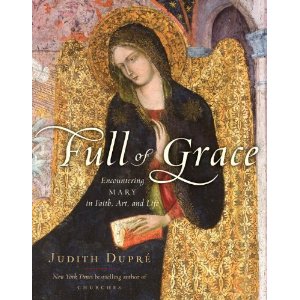Full of Grace--Judith Dupré
Full of Grace
Judith Dupré
Random House; New York, 2010
November 2, 2010 release date
Complementary Review Copy
I arrived home Friday to find myself greeted with an entirely unexpected gift. Full of Grace: Encountering Mary in Faith, Art, and Life by Judith Dupré is a strange sort of book. Part commonplace book, part art and art history, part personal reflection, it is a book that explores the person and idea of Mary from multiple viewpoints, and ends up giving a very interesting, sometimes enormously satisfying portrait and insight into that most enigmatic of Saints.
I was a little concerned by some of the publicity material that accompanied the book, in one quotation Ms. Dupré says, "I wrote the book for people like me--who embrace a religious tradition but don't hesitate to respectfully question it--and for those who aren't particularly religious but year to find meaning in their lives." As any one who has read much in Catholic literature, the first part of that quotation can mean anything from picking around the edges to total deconstruction.
There may be total deconstruction here. If so, I was oblivious to it. I took to heart the lovely, often-full page representations of Mary--both traditional and contemporary. Each of these comes with a (sometimes lengthy) description that sets the piece in time, space, and cultural context. Images include Ancient and Renaissance images we are so familiar with as well as contemporary settings that may be off-putting to some, but represent the plain story in plain context--such as Raphael Soyer's The Annunciation, the author's notes for which provide insight and a depth that I might not have attained on my own.
In addition to the artwork, the text is sprinkled through with prayers, scripture passages, and other quotations from Saints, sermons, and sinners, reflecting on Mary's story or on Mary. For example, in the section about Mary in the Qur'an, we find the following quotation:
"A bridge joins more than just two banks of a river, it connects people to each other and to their dreams." Linda Figg, I-35W Bridge designer, 2008.
The text for this same subject is thought provoking.
from Full of Grace
Judith Dupré
One of Mary's most profound and persistent roles has been as a bridge builder. She joins together what had once been separate, whether traditions, cultures, or peoples, with perhaps no bridge more momentous than the one stretched tenuously between Christianity and Islam. Mary, included among Islam's "four perfect women," is the only female name in the Qur'an, its central holy text. Muslims venerate Mary for her holiness and purity, and, in some schools, as a prophet. Allah, the angels said, preferred Mary above (all) the women of creation (Q 3.42). There is more about Mary in the Qur'an's 114 sura, or chapters, than in the New Testament: thirty-four Qur'anic verses identify her specifically, and the nineteenth sura bears her name. . .
In this meditation, which, respecting Muslim tradition contains no visual, the author goes on to speak of Mary as bridge-builder and caps it off with another quotation. "Mary saves us from denying the kinship among Judaism, Christianity, and Islam: All three live in her spiritual presence"-- Charlene Spretnak Missing Mary, 2004.
The book builds in this continuous round--the beauty of the portraiture of Mary, the power of the quotations, and the simplicity and power of the meditations. All of these make this a book to be savored. I'm afraid I gulped it all down at once. But, I shall return to it time and again, to find passages like the one that follows and to hear once again things I already know in a voice that is new to me.
from Full of Grace
Judith Dupré
Too much of the time I find myself functioning as an atheist, meaning that I pray for God's help yet rely on my efforts alone to power me to some unknown point and uncover the patterns that I so desperately want revealed. There's an incompleteness, a not-yet-ness, that pushes me--maybe you too--to keep searching for the path or at least the map that will show how to transmute the desire for wholeness into wholeness itself. The journey can seem endless. Most days, it's all I can do to summon the patience, the devotion, to keep on keeping on in spite of the psychic birth pangs that overwhelm me. The emptiness feels like a chasm that I'm trying to cross, all the while despairing of my inability, some inherent weakness, that keeps me from passing over the stony landscape I lug along inside me. And why do I have to cross that stony landscape anyway? Why can't I just be content with whatever small steps have already been taken, accept my limitations, be a mere mortal, and let it be? And where is the stopping point? I realize I am less like an olive and more like one of those trucks blasting furiously down the road to Jerusalem. God can really drive you crazy with the waiting, the wondering, and the wandering. I don't like navigating by what seems like the flame of a match, but sometimes that's the only available light. Life doesn't proceed according to our schedules. It asks us to wait, as Mary did. Sometimes it calls for the patience of pregnancy and sometimes for the longer patience of an olive tree.
This gift comes as a reprieve for me, as water in the desert, as a beautiful and sweet-smelling blossom. The author appears to be a person of sensibility with whom I would not mind a few ours of quiet conversation. And lo, this book offers me a great deal more than so small and momentary a respite.
High recommended *****

Comments
Post a Comment